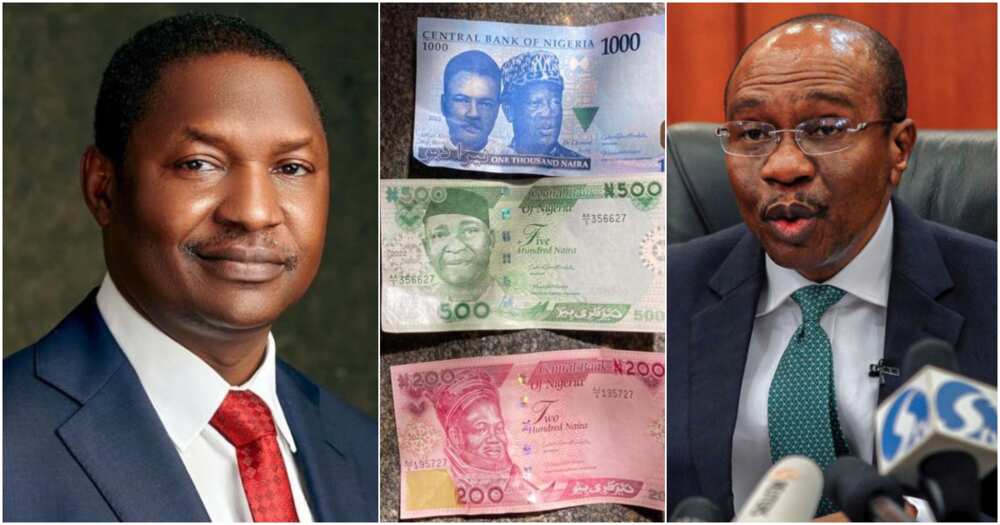Top Stories
Supreme Court Adjourns CBN New Naira Policy Case To Feb 22

After several hearings from lawyers today, the Supreme Court adjourned the currency policy suits to Wednesday, February 22.
The Editor Nigeria reports that the state governments of Kaduna, Kogi, and Zamfara had, on February 3rd, dragged the Federal Government to the Supreme Court over the naira redesign policy of the Central Bank of Nigeria (CBN).
The states urged the Supreme Court to compel President Muhammadu Buhari, the CBN, and commercial banks to rescind the February 10 deadline for the old N200, N500, and N1,000 banknotes as Nigeria’s legal tender.
During the court sitting today, CBN Governor, Godwin Emefiele, explained why there was still a scarcity of the new notes after weeks of unveiling the new currencies.
He said: “Panic mop up of notes, the CBN has also noticed that some of our leaders are buying the notes and storing them for whatever purposes.
“We have also noticed that some Nigerians are catalysing the time transition to charge exorbitant fees, these selfish actions for personal monetary gains are causes of hardship for Nigerians and come at the expense of lives and livelihood.”
Non-Compliance With Court Order
Speaking during the hearing today, the lawyer standing in for the Kaduna State government, Abdulhakeem Mustapha (SAN), drew the FGN’s alleged flouting of the court order last week by the non-compliance to the extension of the use of the old naira notes.
In a swift response, Kanu Agabi and Mahmud Magaji, all SANs who appeared for the federal government, argued that the claim is based on “rumours out there.”
The panel, however, said the issues could not be attended to immediately until all the processes are filed abs served. But Mustapha insisted that the FGN is acting in executive recklessness by ignoring the order.
He, therefore, insisted that the extension should subsist.
The panel advised that the processes be filed and served on Friday and replies on Monday to enable a hearing on Wednesday. Emmanuel Ukala (SAN) sought to move a separate application by the Rivers State Government.
Delivering his ruling, the presiding judge, Justice Inyang Okoro, postponed further hearing till February 22.
No Need For Renewal Of Court Order
Meanwhile, before declaring February 22 as the next hearing date, Justice Okoro, who presided over a seven-member court panel, argued Mustapha’s prayer for a renewal of the court order.
The judge upheld that there was no need for a renewal of the order since the order made earlier on February 8 was made pending the determination of the motion for injunctions filed by the plaintiff. He stressed that the order still subsists since the motion was not yet heard.
He subsequently asked Mustapha to file a proper application to put forward his complaints and to enable the respondent to respond appropriately.
The court had, in the February 8 ruling, said: “after a careful consideration of this ex-parte application, and the grounds in support of same, this court finds that there is real urgency for this court to intervene by the grant of this application.
“Accordingly, this application is hereby granted as prayed.
“That is to say, an order of interim injunction restraining the Federal Government of Nigeria, either by itself or acting through the Central Bank of Nigeria (CBN) and/or the commercial banks, its agents; agencies, corporations, ministries, parastatals, organizations or through any person or persons (natural and artificial) howsoever, from suspending or determining or ending on the 10th of February 2023 the timeframe within which the now older versions of the 200, 500 and 1000 denominations of the naira may no longer be legal tender, pending the hearing and determination of the plaintiffs/applicants’ motion on notice for interlocutory injunction.”
By this ruling, the old denominations remain legal tender until a ruling is passed by the court in the next hearing.


 Top Stories12 hours ago
Top Stories12 hours agoTinubu’s Aide Condemns Plan To Reinstall ‘Jesus Is Not God’ Banner In Lekki Mosque

 Top Stories7 hours ago
Top Stories7 hours agoBreaking: FIRS Announces Fresh Recruitment, See Eligibility Criteria, Application Deadline

 News13 hours ago
News13 hours agoPetrol To Sell ₦935/Litre From Today – IPMAN

 Top Stories13 hours ago
Top Stories13 hours ago2025 Budget Cannot Address Nigeria’s Economic Challenges – Atiku

 Top Stories10 hours ago
Top Stories10 hours agoPrimate Ayodele’s Prophecies For 2025

 Entertainment12 hours ago
Entertainment12 hours agoI will be more influential in Nigeria than UK – Tobi Adegboyega

 News12 hours ago
News12 hours agoPresident Tinubu’s reforms not responsible for food stampedes – FG








